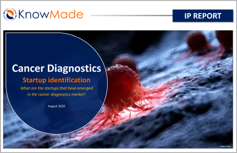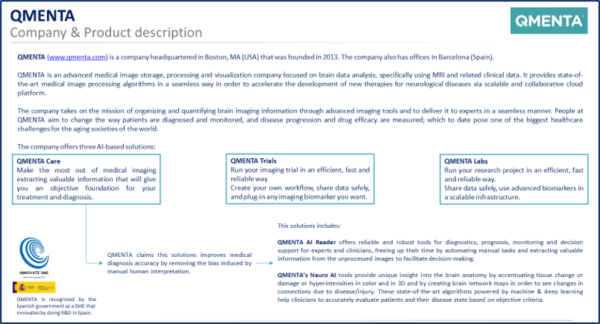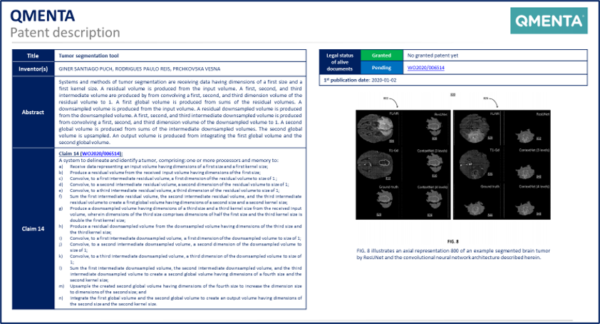
What are the startups that have emerged in the cancer diagnostics market? What are they working on? Who are the key people in these companies?
Publication August 2020
| Download Flyer | Download Sample |
Report’s Key Features

- PDF with > 430+ slides
- Identification & mapping of the startups that recently started to work in the field of cancer diagostics.
- Identification & mapping of the startups that recently started to work in the field of cancer diagnostics.
- Segmentation by technology (Medical imaging, Software, AI-based tool, Biochemical analysis, Molecular diagnostics, Lab-on-chip, Liquid biopsy etc.)
- Description of the startups and their current stage of product development, funding rounds and subsidies.
- Presentation of all their relevant published patent families.
- Description of key people and their background.
Related health patent reports. Explore the patent landscape and gain unique insights through our custom studies.
Over 150 startups working in the field of cancer diagnostics were identified
The World Health Organization estimates that cancer was responsible for the death of about 9.6 million people in 2018 making of it a leading cause of death worldwide. A delay in the treatment of cancer can result in a considerable decrease of the patient’s chance of survival. Therefore the cancer diagnostics market is booming and highly competitive with a large number of big and small players operating in different market segments. Moreover, a strong need for new diagnostics exists to allow earlier detection with higher sensitivity and higher specificity. New startups are founded every year with the aim of developing the next big diagnostic technology. In this highly diverse and rapidly changing ecosystem, it is crucial to identify new players and monitor their activities to determine opportunities, threats, potential partnerships and collaborations. Because of their small size and technological diversity, these young companies are hard to identify by conventional approaches (web searches, workshops etc.). In this report, Knowmade has thus investigated patents related to cancer diagnostics in order to identify startups through their patent filings. 154 startups having filed their first patent application between 2018-2020 were thus identified, and for 74 of them, the report describes their main activity, products, patents, and key people among their staff. This study reveals that molecular diagnostic is the market that is the more explored by the selected startups, with an emphasis on the applications related to genetic testing. Medical imaging is also a field of interest for several startups identified. Most of which are working on software solutions to improve the interpretation of medical images using artificial intelligence.
Why use patents to identify startups?

Detecting hidden companies
Looking at patent documents makes it possible to identify companies that do not communicate much or even at all. It is a good way to detect companies that could not be found using more conventional methods (e.g. trade fairs, conferences, web searches, etc.).
Assessing the technology
Technology is one of the keys to a startup’s success and being able to understand and assess it is highly valuable. The specification of a patent document includes a lot of technical information that can be used to determine the advantages brought by new inventions. The patent claims can also be used to determine the protection the applicant is asking for, and therefore where its interest resides.
Identifying the key people
The success of a startup is strongly linked to the team that composes it. It is therefore important to know the founders and inventors to assess the odds of its success. Patents enable the identification of inventors inside the companies. These inventors are technical experts who have laid the foundation of the technology the startup is developing. Describing the background of key people can help in understanding the startup project, and their history can reveal the extent of the know-how they have accumulated.
Startup Identification
Startups have been identified by screening the patent documents published in 2019/2020 claiming technologies related to cancer diagnostics. For each startup identified, the report provides a complete description of its activity and the stage of development of its product. Information about funding rounds and subsidies are also described.

Patent Description
This report includes a detailed description of all the patents filed by identified startups. The elements provided in each overview slide provide essential information to quickly understand the patented technology. For each patent family described, the publication number of Granted/Registered and Pending members are provided, as well as the abstract, the first claim, relevant information about the invention and the most relevant figure (e.g. figure explaining how the invention can be carried out, illustrating its efficacy, etc.).

Key People Description
This report includes a description of the key people and/or inventors involved in each selected startup. Knowing the key people behind a startup helps assessing its chances of success by determining their individual strength and their complementarity. This report is focused on the description of the people who have a technical background. For each key person, the report shows a summary of their educational background, employment history, as well as their other current activities and a link to their LinkedIn profiles.

